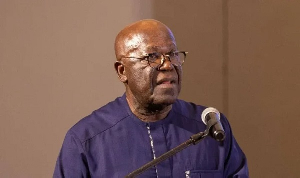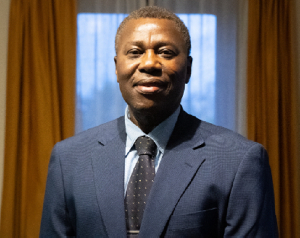Participants at a day’s workshop, have called on the government to review the laws on small scale mining to deter people from engaging in it.
They noted that if stringent laws, coupled with effective and efficient monitoring programmes were put in place, it would go a long way to stem the negative effects of mining activities on humans, the environment, water bodies and food crops.
The participants, contributing to the workshop organised by the Takoradi office of the Minerals Commission on the theme, "Mineral rights and the impact of illegal mining activities on the environment" at Daboase in the Wassa East district, expressed worry about the activities of illegal mining in the country which has heavily polluted many of the water bodies in the country.
The participants, made up of chiefs, queen mothers, assembly members, unit committees, the Police, district coordinating directors and heads of departments, were taken through the procedures for granting mineral rights in the country and the Impact of illegal mining on the environment.
They commended the government for the ban on illegal mining, but stressed that more monitoring of the activities of illegal miners should be done to curb the destruction of the nation's water bodies and forest.
The participants expressed concern about the long procedure one has to follow in order to acquire a mining license, noting that this had brought about the large numbers of people going into illegal mining because illegal miners did not need licence to operate.
The participants therefore appealed to the Minerals Commission to relax the process to enable qualified people to acquire genuine mining license.
Mr Joseph Bassaw a senior technologist with the Western Region Minerals Commission who took the participants through the "impact of illegal mining activities on the environments”, called on stakeholders to protect the mining industry as part of measures to curb illegal mining in the country.
“Let’s come together and see the mining industry as ours and as stakeholders, we should be interested in knowing what happens to our mining industry, “he said.
Mr Bassaw said the mining sector has consistently been the highest gross foreign exchange earner from 1999 to date and was also a major employer.
He said 28,000 people were in the large-scale mining industry and about 1,000,000 people were engaged in small scale mining of gold, adding that apart from the employment of about one million people directly in the sector, artisanal small-scale mining currently contributes about 34 percent of gold production.
Mr Bassaw said though Artisanal Small-Scale Mining (ASM) has some benefits, it also has serious effects on humans due to the use of chemicals such as mercury, acid and cyanide, stressing that the exposure to mercury could affect the nervous system, leading to neurological symptoms such as nervousness, anxiety, depression, irritability or mood changes and numbness.
Mr Desmond K. Boahen, Principal Inspector of Mines at the Minerals Commission, who educated the participants on the procurement for granting mineral rights in the country, pointed out that there were laws guiding the mining industry which binds all stakeholders.
He explained that mining licence for small scale mining was solely for Ghanaians and that it was an offence to grant foreigners licence to engage in small scale mining, adding that it was unfortunate that some Ghanaians front for foreigners to acquire licence to engage in small scale mining.
He urged chiefs, landowners and opinion leaders to always endeavour to scrutinize licenses prospective miners present to them before allowing them to mine in their concession areas.
Mr Boahen said it was important for all institutions playing roles in the promotion and regulation of mining sector to work together to solve all the teething problems facing the mining industry.
Nana kwamina Damoah III, chief of Daboase Maponten said the time has come for all to put their hands-on deck to fight the activities of illegal miners.
He noted that the extent of damage caused by the activities of illegal miners cannot be solely handled by the government.
Nana Damoah called on assembly members, unit committees, area council members to do more and report all illegal mining activities to the appropriate quarters for the necessary action to be taken.
Mr Isaac Kojo Abraham, Head, Communication & IT Department of the Commission, reminded the participants that the monitoring task-force of inter-ministerial committee on illegal mining was still in full force and would continue to arrest and prosecute illegal miners in the country.
General News of Thursday, 2 May 2019
Source: ghananewsagency.org













